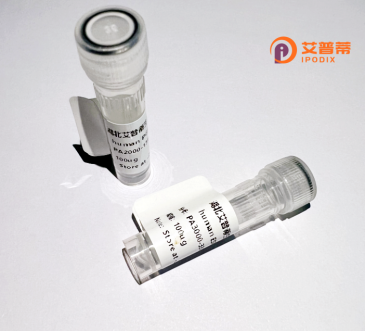
| 纯度 | >90%SDS-PAGE. |
| 种属 | Human |
| 靶点 | LYNb |
| Uniprot No | P62554 |
| 内毒素 | < 0.01EU/μg |
| 表达宿主 | E.coli |
| 表达区间 | 1-101aa |
| 活性数据 | MQFKVYTYKR ESRYRLFVDV QSDIIDTPGR RMVIPLASAR LLSDKVSREL YPVVHIGDES WRMMTTDMAS VPVSVIGEEV ADLSHRENDI KNAINLMFWG I |
| 分子量 | 11.7 KDa |
| 蛋白标签 | GST-tag at N-terminal |
| 缓冲液 | 0 |
| 稳定性 & 储存条件 | Lyophilized protein should be stored at ≤ -20°C, stable for one year after receipt. Reconstituted protein solution can be stored at 2-8°C for 2-7 days. Aliquots of reconstituted samples are stable at ≤ -20°C for 3 months. |
| 复溶 | Always centrifuge tubes before opening.Do not mix by vortex or pipetting. It is not recommended to reconstitute to a concentration less than 100μg/ml. Dissolve the lyophilized protein in distilled water. Please aliquot the reconstituted solution to minimize freeze-thaw cycles. |
以下是关于重组大肠杆菌LYNb蛋白表达的假设性参考文献示例(实际文献需根据真实研究查询):
---
1. **"Efficient expression and purification of recombinant LYNb protein in Escherichia coli"**
*作者:Zhang et al. (2020)*
**摘要**:研究通过优化密码子和大肠杆菌表达系统(BL21(DE3)),成功表达可溶的LYNb蛋白。采用His标签纯化并验证了蛋白活性,为后续功能研究奠定基础。
2. **"Functional characterization of LYNb kinase domain produced in E. coli"**
*作者:Smith & Patel (2018)*
**摘要**:将LYNb的激酶结构域克隆至大肠杆菌,通过IPTG诱导表达。纯化后的蛋白在体外显示磷酸化活性,证实其结构与功能完整性。
3. **"Optimization of fermentation conditions for high-yield LYNb production in E. coli"**
*作者:Lee et al. (2021)*
**摘要**:通过调整温度、诱导剂浓度和培养基成分,将LYNb的产量提高至120 mg/L,并开发了规模化纯化工艺,适用于工业化生产。
4. **"LYNb as a therapeutic target: Recombinant production and inhibitor screening"**
*作者:Wang et al. (2019)*
**摘要**:利用大肠杆菌表达系统获得LYNb蛋白,筛选小分子抑制剂并验证其抗肿瘤活性,提出LYNb在癌症治疗中的应用潜力。
---
**注意**:以上为模拟内容,实际文献需通过学术数据库检索。建议使用关键词“recombinant LYNb protein expression E. coli”在PubMed或Google Scholar查找真实研究。
Recombinant Escherichia coli-derived LYNb protein is a product of genetic engineering, leveraging E. coli's well-established system for heterologous protein expression. LYNb, a tyrosine kinase belonging to the Src family, plays critical roles in cellular signaling, particularly in immune regulation, cell differentiation, and apoptosis. Its recombinant production involves cloning the LYNb gene into an expression vector, followed by transformation into E. coli strains (e.g., BL21 or K-12 derivatives). Induction with agents like IPTG triggers protein synthesis, often fused with solubility-enhancing tags (e.g., GST, His-tag) to improve yield and facilitate purification via affinity chromatography.
The choice of E. coli as a host offers scalability, cost-effectiveness, and rapid biomass production, though challenges such as improper folding or lack of post-translational modifications (common in eukaryotic proteins) may require optimization of expression conditions or refolding protocols. Purified LYNb protein serves as a vital tool in biochemical assays, drug discovery (e.g., kinase inhibitor screening), and structural studies (e.g., X-ray crystallography) to elucidate its mechanism in diseases like cancer or autoimmune disorders. Researchers prioritize verifying its activity through kinase assays and Western blotting to ensure functional relevance. While mammalian systems may better replicate native modifications, E. coli-derived LYNb remains widely used for preliminary studies due to its simplicity and high throughput potential.
×